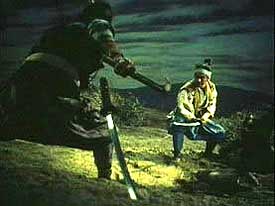 In the excellently staged, thrillingly timed & gorgeously photographed opening sequence to Samurai Trilogy Part II, Duel at Ichijo Temple (Miyamoto Musashi: Ichojoji no ketto, Toho, 1955), Musashi is wandering to perfect his swordsmanship, & to meet "Old Baiken" (Eijiro Tono) in a secluded spot for a duel. In the excellently staged, thrillingly timed & gorgeously photographed opening sequence to Samurai Trilogy Part II, Duel at Ichijo Temple (Miyamoto Musashi: Ichojoji no ketto, Toho, 1955), Musashi is wandering to perfect his swordsmanship, & to meet "Old Baiken" (Eijiro Tono) in a secluded spot for a duel.
History's Shishido Baiken was expert at yoegaki-ryu kusari-gama (Yaegaki school sickle-and-chain art), a fighting style developed among peasants with the express & effective value of disarming & killing samurai. The encounter between Musashi & Baiken is excellently is a marvel to behold; & it costs Baiken his life.
This small episode in Hiroshi Inagaki's film becomes the entire focus of Tomu Uchida's vastly richer Death Match; aka, Duel Without End; aka, Swords of Death (Shinken shobu, Toei, 1971), written by Daisuke Ito. This was the last of Tomu Uchida's six film cycle about Musashi, the most complete adaptation of Eiji Yoshikawa's novel.
The six-film cycle will be discussed at length in separate articles, but a few comparisons to Inagaki will be made throughout the present essay. In Uchida's final installment, Kinnosuke Nakamura (later Yorozuya) as Musashi meets Rentaro Mikuni as Baiken.
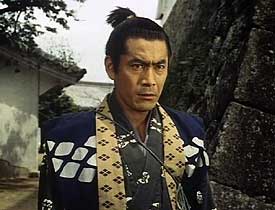 Rentaro Mikuni is the same actor as plays Matahachi in Part I of Samurai Trilogy, replaced by Sachio Sakai in Part II, an excellent actor though he failed to bring the same degree of pathos to the character of Matahachi. Rentaro Mikuni is the same actor as plays Matahachi in Part I of Samurai Trilogy, replaced by Sachio Sakai in Part II, an excellent actor though he failed to bring the same degree of pathos to the character of Matahachi.
One would surmise that Mikuni was replaced in the second part of Inagaki's trilogy only because he had the opportunity to himself take the title role of Musashi Miyamoto (Miyamoto Musashi, Toei, 1954), a harsh, hard-hitting version directed by Yasuo Kohata, based on a tale by Ryotaro Shiba rather than Eiji Yoshikawa.
In the Uchida sextet, Mikuni's not only Baiken in Part VI, but is Priest Takuan in the earlier episodes. It is a credit to Rentaro Mikuni's versatility that he truly seems a very different character in each role.
In Uchida's film depicting the encounter between Baiken & Musashi, it was during this duel that Musashi first conceived of his two-sword style which would evolve into nito-ryu, a very famous form. The sickle-and-chain would otherwise have defeated a single sword.
Uchida's film also includes Baiken's warrior wife Omaki (Hideko Okiyama), who appears in only a bit-part as a villager in Inagaki's trilogy (in Part III), as Inagaki pretty close to uniformly reduces the importance & characters of women whose natures are much more impressive in Eiji Yoshikawa's novel.
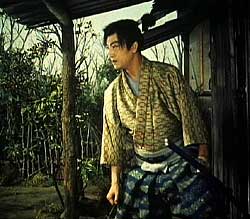 In Inagaki's film, when Musashi goes to have his sword "polished" after it is nicked by Baiken's chain, he learns the difference between a samurai's polished soul & a killer's sharpened blade. "Lessons" of this sort are gained at each stage of Musashi's warrior pilgrimage, & it is not merely in the duels per se that he improves his skills. In Inagaki's film, when Musashi goes to have his sword "polished" after it is nicked by Baiken's chain, he learns the difference between a samurai's polished soul & a killer's sharpened blade. "Lessons" of this sort are gained at each stage of Musashi's warrior pilgrimage, & it is not merely in the duels per se that he improves his skills.
It is also at this time that Toshiro Mifune as Musashi encounters the nodachi, an extremely long sword that outreaches the usual katana used by most samurai. This nodachi is known as "The Clothes Rod," which has also been left at the sword-polisher's shop. It belongs to Kojiro Sasaki, destined to become Musashi's chief rival.
Kojiro is described as "more like an actor than a swordsman," something of a dandy, a good looking fellow who deplores modesty. He is played with glamour & subtlty by Koji Tsuruta, a famous star of the yakuza-eiga (gangster films) that rose to enormous popularity in the 1960s, specializing in soulful ninkyo or chivalry roles. He manages to convey Kojiro as sensitive of spirit despite his vanity.
In the Uchida series, Kojiro is played by another great yakuza-eiga filmstar, probably the greatest, Ken Takakura, at this time not yet the enormous star he would become within a few years. Unfortunately Takakura lacked Tsuruta's subtlety in the role. The conceited "stage actor" element of Kojiro's personaly is too exaggerated by Takakura; it is difficult to believe he could walk around dressed like a kabuki player without feeling foolish. Tsuruta's interpretation treads gracefully on the line between attractive eccentricity & ridiculous excess.
Though my favorite version of Musashi's life is Tomu Uchida's expansive treatment, it could nevertheless be said that his series is flawed by the dreadfully overlong epilogs of each installment, which call for Kinnosuke to spout trite boasts or introspections. By contrast, Inagaki's three films flow more smoothly into a single large entity, making allowances for the episodic nature of even the original novel.
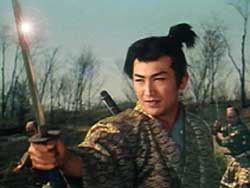 Nevertheless for me Uchida's five-plus-one installments are more enjoyable. Nevertheless for me Uchida's five-plus-one installments are more enjoyable.
Misogyny alone makes Inagaki's version less palatable than Uchida's, although Uchida avoids the problem of misogyny mainly by focusing less lengthily on the uninteresting women of the story, whereas Inagaki just has to let them whine on & on & make terrible burdens out of themselves.
Another think makes Inagaki's version weaker than Uchida's six-part or Tai Kato's two-part Sword of Fury (Miyamoto Musashi, 1973) or Yasuo Kohata's one-film versions:
In Inagaki's lens, Musashi becomes too pat a character. He easily develops from swamp-rat into prestine, facile nobility, which is so unlikely & annoying as to make it difficult to believe the character was ever real, especially as he wasn't. The "real" Musashi remained rather slovenly & rude throughout life & never turned into this simplistic well-groomed hero.
Tai Kato & Yasuo Kohata preferred the grimier, grosser Musashi rendering him very much the nihilistic anti-hero if not an outright villain. But Uchida had so much room that he could let Kinnosuke create a character who conveys sparks of nobility even at his grossest, & as he develops into a more intelligent & spiritual man, he remains a trickster who takes advantage of opponents, using others' greater sense of honor to win every duel even if he has to cheat.
This is a much more compelling portrait than either the complete whitewash of Inagaki or the complete soiling of Tai Kato.
Kinnosuke plays the character with greaer ambiguity. Even the unclean rapist played by Mikuni is more honestly, & a relief from the falsehoods of Inagaki's idealization.
The spiritual but ignoble Musashi conveyed by Kinnosuke is much truer to the novel, which had already cleaned up Musashi's image a great deal. Inagaki cleans him up so much more that he becomes a shallow figure, even though Mifune's startling screen presence overcomes the tepidity of Inagaki's naively wholesome vision.
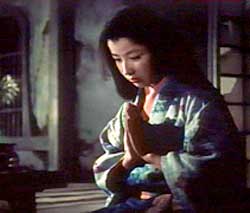 Again meeting Otsu (Kaoru Yachigusa), Mifune as Musashi confesses: "To tell the truth, I prefer my sword to you."
Again meeting Otsu (Kaoru Yachigusa), Mifune as Musashi confesses: "To tell the truth, I prefer my sword to you."
And who wouldn't. She's an excessively dainty, a faint sort of woman who seems to step out of Victorian literature of the west, & just as boring as those corsetted ladies with the vapors.
Another woman is after him too. Akemi (Mariko Okada) from the farmhouse in Part I. She descends into prostitution & treachery by Part III, eventually turning over a new leaf by dying. She's even so more interesting as a character than pansy Otsu who can't even walk from town to town without passing out along the way.
So it's no wonder Musashi is repulsed by women, yet one can't help but notice the director has stacked the deck in the matter, & these familiar women are less related to their counterparts in the novel than they are to women similarly portrayed in other Inagaki films.
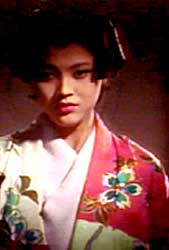 Eventually persistent Otsu gets Musashi alone in a shack in the mountains & they have moments of peace which both he & she consider paradise. But virtuous cocktease that she is, Otsu refuses Musashi's belated physical advances, so Musashi runs away again. Eventually persistent Otsu gets Musashi alone in a shack in the mountains & they have moments of peace which both he & she consider paradise. But virtuous cocktease that she is, Otsu refuses Musashi's belated physical advances, so Musashi runs away again.
The calligraphy of the historic Musashi is at this point quoted on the screen: "I have renounced the love of women." Inagaki unfortunately would interpret this as to mean "because Otsu's frigid."
So in Part I he first rejects women because girls are icky & he is a childish fellow who acts like he's afraid of girls' cooties. Then after three years imprisoned in the tower reading books, he rejects women because he has the new important mission to improve himself. And now in Part II he rejects women because he wanted to screw one & she wouldn't let him.
It begins to look an awful lot like a pattern, with every excuse trumped up to consider women dreary dreadful things. This interpretation isn't essential from the novel & was not what other directors so much embraced.
Musashi's arch-rival on the other hand is jealous that Musashi has not one but two women traipsing after him. Kojiro likes women a lot. He likes Akemi in Part II, & he'll go for Omitsu (Michiko Saga) in Part III. Again, in the film's misogynist symbolism, this foreshadow's Kojiro's failure, vis-a-vis Musashi the winner who won't touch the critters. This parallels Matahachi who could not avoid women in Part I & found himself in no end of trouble in Part II, but Musashi's ability to resist feminine wiles put him on his road to improvement.
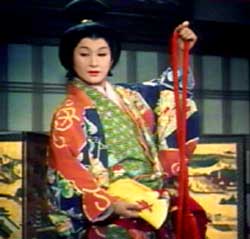 The most interesting woman in the whole series is the courtesan Yoshino Dayo (Michiyo Kogure) in Kyoto, whose calm demeanor is something Musashi lacks & admires. The most interesting woman in the whole series is the courtesan Yoshino Dayo (Michiyo Kogure) in Kyoto, whose calm demeanor is something Musashi lacks & admires.
Like priests & the sword-polisher, Yoshino has something to teach Musashi on his musha-shugyo. In essence Yoshino is just a stereotyped, pedistalized, high class "hooker with a heart of gold." Yet within this derogatory framework, she is the only woman treated fairly in the entire tirlogy.
The other women try to keep their men from pursuing their destinies. Yoshino not only teaches Musashi composure, but represses her urge to whine at his feet, knowing full well that begging him not to duel would be begging him not to be Musashi. And in Tomu Uchida's version of these events, Yoshino is even more interesting because the portrait of courtesan lifestyle & skill is conveyed in depth.
Matahachi's mother Osugi (Eiko Miyoshi) is chasing after Musashi because she feels he stole her son's bride-to-be, Otsu. In the Tomu Uchida films, this character is comic relief, but nonetheless bold, brave, & noble in her way. She believes she has an honest grudge & pursues vengeance as the morality of her time required. She is helped by many persons who respect her intentions.
But for Inagaki, even an old woman with a grudge cannot be permitted a decent character. She is portrayed as loveless & ruthless, but too ridiculous to succeed. Her son Matahachi has misled her of course, but only because he is so bamboozled by her that he fears to tell the truth, which is that he abandoned Otsu because of his own weakness.
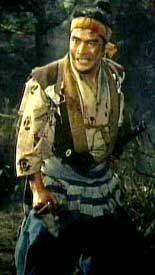 Matahachi has come into possession of a scroll intended for Kojiro Sasaki, & claims it is his own diploma of swordsmanship. He has taken the name Kojiro to indicate the change in his life. But of course, he's not a good swordsman at all & couldn't possibly live up to his fraud.
Matahachi has come into possession of a scroll intended for Kojiro Sasaki, & claims it is his own diploma of swordsmanship. He has taken the name Kojiro to indicate the change in his life. But of course, he's not a good swordsman at all & couldn't possibly live up to his fraud.
In the film's most humorous scene, Matahachi is chasing after Otsu to kill her as Mother Osugi has commanded, when Kojiro Sasaki intervenes.
Matahachi poses threateningly (since his mother is watching) & claims to be trained in a famous school, adding, "My name is Kojiro Sasaki. Are you surprised?"
Kojiro replies very calmly, "Yes I am. I've never been so surprised in my life."
Musashi meanwhie is off to duel with the sensei or teacher of a famous old sword school. He discovers along the way that he will not be met by the school's instructor Yoshioka (Akihiko Hirota), but by eighty of the man's students.
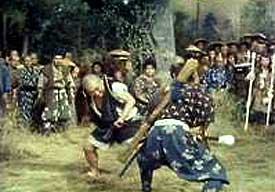 Despite treachery, Musashi feels it would be cowardly not to show up. He arrives, kills quite a few young men, then runs away to meet the instructor after all, defeating him but sparing his life because by now Musashi has learned humanity. Despite treachery, Musashi feels it would be cowardly not to show up. He arrives, kills quite a few young men, then runs away to meet the instructor after all, defeating him but sparing his life because by now Musashi has learned humanity.
This climactic duel was more lavishly filmed by Tomu Uchida. The action, far from being plain empty violence, is framed in a richer plot with a more complex character. In Inagaki's version of the duel at Ichijo Temple, he leaves out the primary element of the original story, which Uchida preserves to great effect.
As played out by Kinnosuke Nakamura, Musashi ran pall-mall into the treacherous set-up in order to kill a little child who was heir to the school of swordsmanship, thus winning the day on a technicality.
He also blinded an enemy with a single swordstroke; the blinded man reappears in Uchida's fifth episode as a stonecarver making statues of Jizo-sama, patron of children, near the place where the child heir was so callously slain.
Uchida shows us a Musashi changed by his actions, living uneasily with the fact that he's a child-killer. Tai Kato's version shows a cold-hearted Musashi unmoved by his cruel acts. Inagaki's posturing, dishonest film would have us believe in a flawless Musashi who went from veritable swamp-rat to superhero in three easy films so that he even spares a treacherous foe's life.
copyright © by Paghat the Ratgirl
|
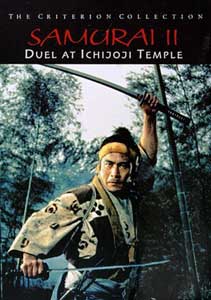

 Rentaro Mikuni is the same actor as plays Matahachi in Part I of Samurai Trilogy, replaced by Sachio Sakai in Part II, an excellent actor though he failed to bring the same degree of pathos to the character of Matahachi.
Rentaro Mikuni is the same actor as plays Matahachi in Part I of Samurai Trilogy, replaced by Sachio Sakai in Part II, an excellent actor though he failed to bring the same degree of pathos to the character of Matahachi.
 Nevertheless for me Uchida's five-plus-one installments are more enjoyable.
Nevertheless for me Uchida's five-plus-one installments are more enjoyable.
 Eventually persistent Otsu gets Musashi alone in a shack in the mountains & they have moments of peace which both he & she consider paradise. But virtuous cocktease that she is, Otsu refuses Musashi's belated physical advances, so Musashi runs away again.
Eventually persistent Otsu gets Musashi alone in a shack in the mountains & they have moments of peace which both he & she consider paradise. But virtuous cocktease that she is, Otsu refuses Musashi's belated physical advances, so Musashi runs away again. The most interesting woman in the whole series is the courtesan Yoshino Dayo (Michiyo Kogure) in Kyoto, whose calm demeanor is something Musashi lacks & admires.
The most interesting woman in the whole series is the courtesan Yoshino Dayo (Michiyo Kogure) in Kyoto, whose calm demeanor is something Musashi lacks & admires.
 Despite treachery, Musashi feels it would be cowardly not to show up. He arrives, kills quite a few young men, then runs away to meet the instructor after all, defeating him but sparing his life because by now Musashi has learned humanity.
Despite treachery, Musashi feels it would be cowardly not to show up. He arrives, kills quite a few young men, then runs away to meet the instructor after all, defeating him but sparing his life because by now Musashi has learned humanity.